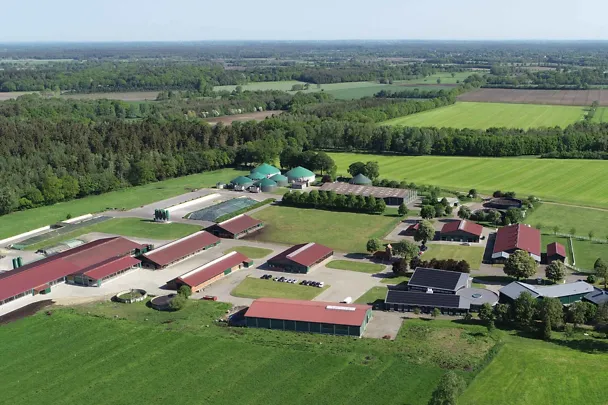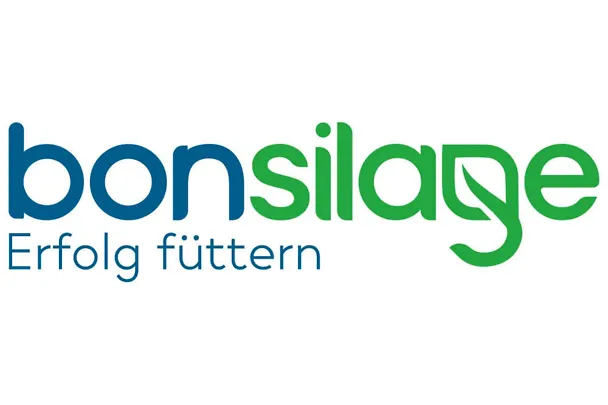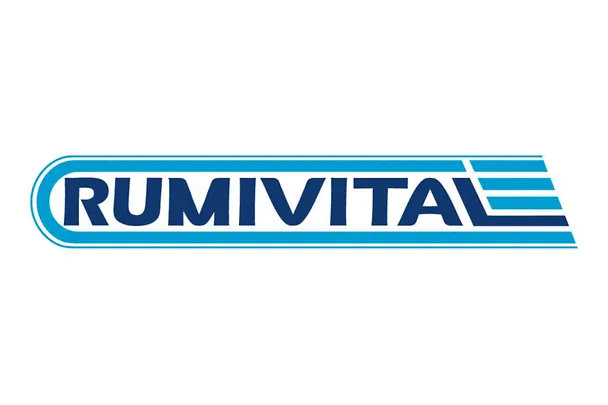Eine starke Kombination: bonsilage und RUMIVITAL reduzieren die Methanintensität

Methane, a well-known greenhouse gas, is often associated with agriculture and cattle farming in particular. Although it accounts for only 7.4% of total greenhouse gas emissions in Germany, cattle production can contribute to further reductions. There are currently many research projects in this area, while SCHAUMANN already offers the forward-looking added benefit of increasing CO2 efficiency in cattle farming with its proven product concepts bonsilage and RUMIVITAL. The effect of these two SCHAUMANN products has now been confirmed by an independent institute at Gut Hülsenberg.
Forage optimisation – higher performance, less methane
The breakdown of crude fibre in the rumen produces hydrogen and carbon dioxide. As hydrogen is toxic to microbes, they immediately convert it into methane, which is harmless to them. The gas escapes into the environment through what is known as belching. As a ruminant, the cow must be supplied with sufficient fibre to remain healthy and productive. Therefore, the focus in practical dairy cattle feeding is not on completely avoiding methane formation, but on reducing methane intensity. This means reducing the amount of methane produced per kg of milk produced.
Utilise savings potential in forage with bonsilage

The efficiency of feeding depends heavily on the production of basic feed. Losses along the entire production chain, from the field to the feed stock to the feeding table, also have an impact on emission potential.
For example, inadequate silage storage causes significant CO2 emissions from yeast, mould, reheating losses and disposal of spoiled silage, without any corresponding milk yield. This has a significant impact on the CO2 balance of milk production.
Our bonsilage silage inoculant contains a balanced combination of homo- and heterofermentative lactic acid bacteria to lower the pH value of grass and maize silage during ensiling. This efficiently suppresses the growth of yeasts and moulds. The fermentation acid pattern shifts towards more acetic acid and other positive fermentation products such as propylene glycol. At the same time, palatability and digestibility are increased, while faulty fermentation is avoided. In addition, high-quality forage increases feed intake.
RUMIVITAL – Feed conversion as a key factor

The better the digestibility of the ration, the lower the feed requirement per kg of milk. Every kg of feed that is not produced or purchased also reduces the carbon footprint of milk production.
Our active ingredient RUMIVITAL, a product of solid fermentation with fungi, promotes fermentation processes in the rumen and thus improves feed digestibility. Through improved breakdown of cell walls and thus better utilisation of cell contents, Rumivital sustainably increases feed efficiency..
Even stronger together
The combination of bonsilage and RUMIVITAL minimises forage losses, reduces the need for purchased feed and increases the digestibility of the total production. As a result, the carbon footprint per kg of milk is reduced.
Certified recipe for success in practice
The studies conducted at the company's own Gut Hülsenberg farm focused on the extent to which our feeding concept with bonsilage silage additives and RUMIVITAL affects methane emissions, i.e. the CO2 equivalent per kg of milk. The average herd performance of the approximately 220 Hülsenberg dairy cows was approximately 38 kg/cow per day during the evaluation period.
As an independent institute for the certification and validation of sustainability standards, Control Union Certifactions GmbH carried out a comprehensive assessment based on data from Gut Hülsenberg from 2022 and 2023.
All herd and feeding data was recorded and evaluated over a period of 317 days. Control Union determined a reduction in CO2 equivalents of 13.3 g per kg of milk, which corresponds to a total saving of approximately 32 tonnes for the entire dairy herd during the study period.
Conclusion: Reduced greenhouse gas emissions
The use of the tried-and-tested feeding concept with bonsilage silage additives and RUMIVITAL at Gut Hülsenberg has been proven to reduce methane intensity (CH4/kg ECM) and greenhouse gas emissions in practical operation.


